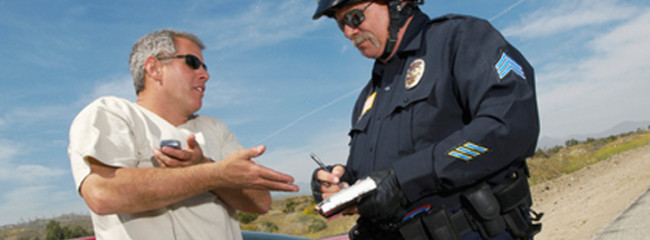The supermarket checkout isles are awash in tabloids whose existence depends upon us believing that what is in print must be true. They do a great business. The same is true for many sites on the internet giving advice about what to do when stopped by police. These sites, written by legal-eagle wannabes, have one thing in common. You can almost always count on them to get you into trouble.
Believing the tabloids about who is smooching whom probably won’t have any practical impact upon your life. But if you believe some of the myths on YouTube videos about what you should do during a traffic stop, you can find yourself in handcuffs (the kind which don’t involve smooching).
A motorist in my area made the news recently when he declined to provide his license & registration. He insisted the officer tell him why he was stopped first. The officer refused to answer and repeated the demand. It went downhill quickly. The driver was pepper sprayed and arrested.
The case is pending. The officer was suspended. There are issues of false arrest, improper procedure, excessive force and free speech (the case began with the motorist allegedly giving the officer the middle finger). For our purposes, the question is whether one has to provide an officer with your license and other documentation during a traffic stop.
The answer is simple: You MUST provide your license, registration and proof of insurance. Vehicle & Traffic Law (VTL) § 401 (4) specifically identifies your driver’s license and auto registration as documents which must be produced to an officer. VTL § 1102 states no person shall refuse to comply with any lawful order or direction of a police officer. Whether the order is lawful or not will not be settled on the roadside by arguing with the cop. The Court will decide.
On the federal level, the Supreme Court just spoke on this issue. In a 6 to 3 decision, they held “…ordinary inquires incident to a traffic stop…” include “…checking the driver’s license, determining whether there are outstanding warrants against the driver, and inspecting the automobiles’ registration and proof of insurance.” Rodriguez v. US, No. 13-9972 — Decided April 21, 2015.
The videos on YouTube with motorists trying to stymie the police may be fun to watch, but they should come with the warning label: “Don’t try this at home”. When stopped by the police, you must produce your license, registration and insurance card. You do not have to answer other questions or agree to a search of your car (although you cannot use force or the threat of force to try and stop a search). In my next post, I’ll write more about what to say and what not to say to the police if you are stopped.


Helpful insights on the legal implications of showing your license and registration during a traffic stop. lanai enclosure
Reply夢巴黎春藥網:https://pariss88.com/
女性催情春藥:https://pariss88.com/product-category/aphrodisiac/
女性迷幻春藥:https://pariss88.com/product-category/psychedelic/
印度正品代購:https://pariss88.com/product-category/medicine/
男性壯陽補腎:https://pariss88.com/product-category/kidney/
陰莖增大增粗:https://pariss88.com/product-category/thicken/
GB系列春藥:https://pariss88.com/product-category/aroused/
所有春藥商品:https://pariss88.com/shop/
春藥資訊:https://pariss88.com/blog/
關於我們:https://pariss88.com/about-us
Reply春藥對女性性慾望的顯著增強作用!
春藥是最受歡迎的女性催情藥物,讓愛火重燃的秘密武器!
春藥是什麼?揭開女性催情藥的神秘面紗
春藥如何影響女性性反應?揭開春藥的實際效果
春藥會讓人上癮嗎?揭開女性催情藥的真實效果與安全性
春藥效果解析:提升女性性慾與性愛滿意度的秘密武器
春藥對女性身體的深層影響:從血液循環到極致快感的全面解析
春藥的效果與作用:提升女性性慾望與性滿意度
春藥效果與作用全面解析:激發女性性慾與改善性冷淡
春藥是激發女性性慾望及提升性高潮快感的秘密武器
春藥的催情效果全解析:讓性愛更激情性高潮更猛烈
春藥效果大揭密:找回激情性愛的秘密武器!
女性服用春藥後的真實反應:從羞澀到淫蕩發騷的轉變
春藥如何幫助女性體驗激情性愛:全面指南
春藥:點燃女性激情,體驗極致性愛享受的秘訣
春藥如何通過刺激女性荷爾蒙來增強性快感?
春藥如何幫助女性找回激情性愛,享受極致快感?
春藥如何激發女性淫蕩慾望,讓女性主動求愛的?
春藥在兩性關係中起到哪些作用?解析春藥的效果
春藥在性愛中的關鍵作用:釋放女性淫蕩慾望
春藥如何讓女性淫蕩發情主動求歡:全面解析春藥效果
春藥如何幫助女性重燃性愛激情體驗美妙性高潮?
春藥的神奇效果:從淑女到淫蕩發騷的轉變
春藥的催情效果:讓女性在性愛中欲仙欲死的極致體驗
春藥的效果:激發女性性慾望的深度解析
春藥番外篇:天然春藥與合成春藥的效果對比
Reply春藥
媚藥
催情春藥
催情藥
女性春藥
春藥哪裡買
春藥推薦
春藥是什麼
春藥水
有效春藥
正品春藥
無色無味的春藥
網購春藥
進口春藥
女性媚藥
日本媚藥
日本春藥
春藥真的有用嗎
春藥有副作用嗎
催淫春藥
春藥膠囊
粉狀春藥
液體春藥
昏睡春藥
迷情春藥
迷幻春藥
催眠春藥
口交水
聽話水
乖乖水
失憶水
催情水
迷姦水
迷姦藥
迷幻藥
高潮液
催情液
春藥粉
女性發騷水
淫蕩發騷春藥
女性催淫春藥
激發女性性慾
增強性快感
增加女性主動
增加女性分泌物
增加女性敏感度
治療女性性冷淡
誘發女性性渴望
事後無記憶
迷幻催情春藥
昏睡失憶春藥
強效催情春藥
女性淫蕩發騷
女性催情膠囊
無副作用春藥
女性潮吹春藥
男女通用型春藥
催情口服液
無色無味的春藥
催情春藥水
女性催情媚藥
昏睡迷姦春藥
無色無味春藥水
超強淫蕩媚藥
女性外用春藥
刺激陰蒂快感
女性催情高潮液
女性私處高潮液
女性高潮潤滑劑
女用催淫凝膠
強效催情凝膠
發騷春藥凝膠
Reply天使の淚:https://pariss88.com/product/tszl/
KKK3迷姦粉:https://pariss88.com/product/kytr/
SAOB強效昏睡液:https://pariss88.com/product/sabb/
嘜可奈因:https://pariss88.com/product/mkny/
Raging催情失憶水:https://pariss88.com/product/raging/
香港彼迪三唑侖片:https://pariss88.com/product/szlh/
DEEP SLEEP催眠忘情水:https://pariss88.com/product/degn/
獵艷春藥水:https://pariss88.com/product/sdaf/
乖乖水:https://pariss88.com/product/ggsw/
T2超強催眠液:https://pariss88.com/product/twer/
DDK迷姦粉:https://pariss88.com/product/ddky/
FM2迷昏粉:https://pariss88.com/product/fmsx/
惡魔丘比特:https://pariss88.com/product/emqb/
香港GHB:https://pariss88.com/product/ghby/
瀰漫之夜:https://pariss88.com/product/gtrw/
美國GHB:https://pariss88.com/product/ghbt/
美國迷情水:https://pariss88.com/product/mgmq/
美國VVK陰莖增大丸:https://pariss88.com/product/wenv/
美國GOODMAN陰莖增大丸:https://pariss88.com/product/gman/
美國MAXMAN二代陰莖增大丸:https://pariss88.com/product/maxc/
VigRX Plus陰莖增大丸:https://pariss88.com/product/vigr/
粉色佳人艾力達雙效片:https://pariss88.com/product/kista/
必利吉藍P雙效片:https://pariss88.com/product/pfjn/
印度樂威壯Levifil-20mg:https://pariss88.com/product/levi/
印度紅魔犀利士雙效片:https://pariss88.com/product/xtra/
印度超級希愛力雙效片:https://pariss88.com/product/uper/
印度必利勁(POXET-60):https://pariss88.com/product/poxe/
印度特級阿伐那非雙效:https://pariss88.com/product/lana/
犀利士5mg每日錠:https://pariss88.com/product/tada/
犀利士Vidalista 40mg:https://pariss88.com/product/vita/
印度雙效犀利士80mg:https://pariss88.com/product/supe/
印度艾力達雙效片:https://pariss88.com/product/extr/
Reply